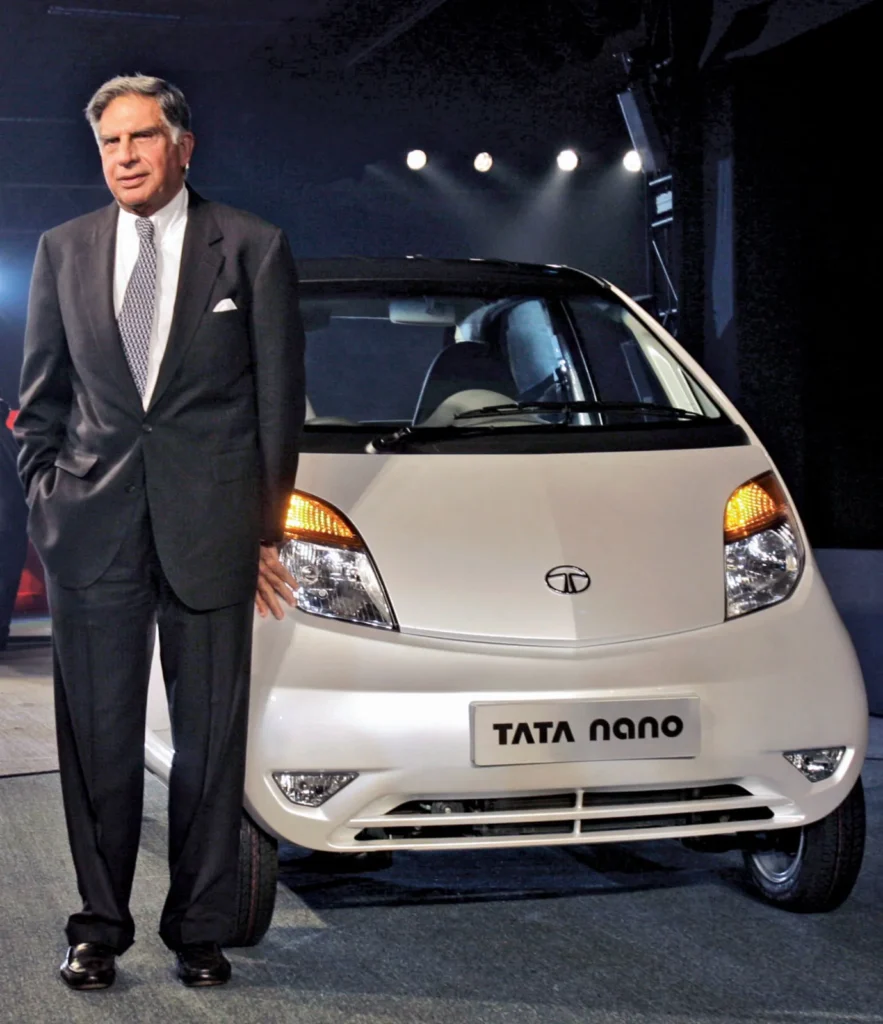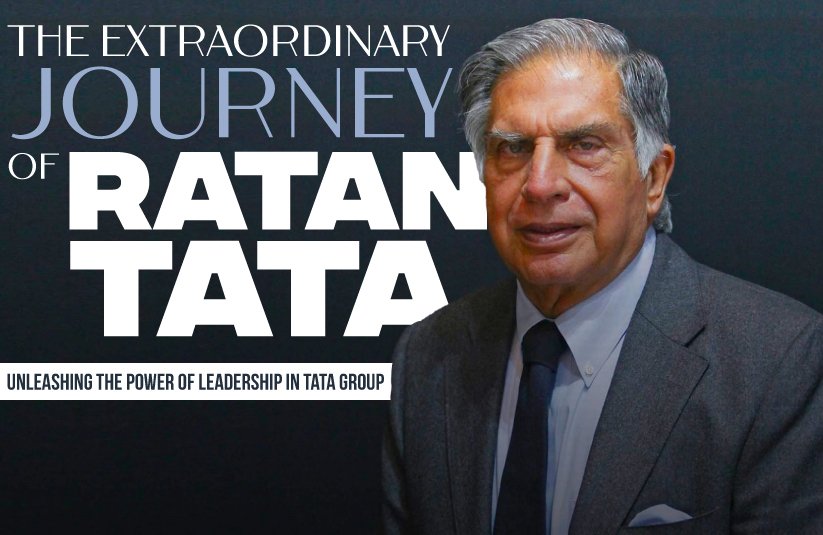From Humble Beginnings to Iconic Leadership
An Inspiring Journey to Success
He may come from a business dynasty but by taking Tata Sons truly global, he has made a lasting impression – and given even more back to India in the process.
Back in 1955, teachers at Ratan Tata’s Riverdale Country School wrote in his yearbook, “Ratan’s charming and unassuming character is sure to bring him success. We are sure that if he continues to develop his charm and intelligence to the full, he will have a happy and useful life.”
It sounds like Tata, who will turn 84 on 28 December, made quite an impression as a teenager, but surely even his teachers could not have imagined the enormous impact he would have on his home continent.

Early life and Education
Ratan Tata was raised with strong values and a profound sense of responsibility, despite the conflict in his family. He attended the Mumbai-based Campion School before completing his optional coursework at the Basilica and John Connon Schools. He went on to earn a degree in structural engineering and architecture at Cornell University in the United States. Ratan Goodbye’s whimsical decision of business concentrates on over design mirrors his particular way to deal with advancement and critical thinking.
In the wake of moving on from Cornell in 1962, Goodbye momentarily worked at Jones and Emmons, a Los Angeles-based engineering firm. However, motivated by a sense of obligation to support the family business, he quickly returned to India. This noticeable the start of his excursion with the Goodbye Gathering.
Career and Changlles
When Ratan Tata joined the Tata Group, he didn’t immediately achieve success or power. He began his career alongside blue-collar workers at Tata Steel in Jamshedpur on the shop floor. He gained a profound understanding of the gathering’s contemporary tasks and workforce challenges through this significant experience. His basic years at the Farewell Social affair were trying. Ratan Farewell faced impediment from senior bosses who felt a little unsure of his capacities.
He was given the responsibility of running Nelco, a Tata subsidiary that was having difficulties but specialized in consumer electronics. Disregarding his undertakings, Nelco faced tremendous financial incidents, which incited its conceivable decision. From this initial setback, Tata gained valuable knowledge about perseverance, the significance of innovation, and the need to maintain composure.
Humble beginnings
The Tata Group now operates in more than 100 countries across six continents, and has companies in every area of society, including energy, automotive, engineering and information technology. In 2020–21, the revenue of Tata companies was US$103 billion, with more than 800,000 employees. The 29 publicly listed Tata enterprises have a combined market capitalization of US$242 billion.
Ratan Tata’s defining moment came in 1991, when he was designated the executive of Tata son’s, the holding organization of the Tata group, succeeding J.R.D. Tata. The Indian economy was liberalizing at the time of his appointment, which presented both challenges and opportunities. Ratan Tata confronted incredulity from inside the association and the more extensive business local area, who questioned whether he could satisfy the tradition of his ancestors.

“Our grandmother taught us to retain dignity at all costs, a value that’s stayed with me until today.” – Ratan Tata
Tata Group, from 1991 until his retirement in 2012. During his tenure, the Group’s revenues grew, totalling more than US$100 billion in 2011–12.
A visionary, under his guidance the company became known for its ‘reverse colonialism’ as it bought tea firm Tetley for US$407 million in 2000, Anglo-Dutch Corus Group for US$12 billion in 2007 and Jaguar Land Rover for US$2.3 billion in 2008. Additionally, the business acquired hotels, chemical companies, communications networks, and energy providers worldwide.
Key Achievements and Innovations
Global Expansion
Under Ratan Tata’s leadership, the Tata Group experienced significant global expansion. One of the most significant purchase was Tata Tea’s (now Tata Consumer Products) purchase of Tetley Tea in 2000, which made Tata Tea the second-largest tea company in the world. The next high-profile deals were the purchase of the European steelmaker Corus and the well-known British automakers Jaguar and Land Rover.
In addition to increasing the group’s global presence, these prchase were strategic moves to reduce the group’s reliance on the Indian market and diversify its business portfolio. Ratan Tata’s bold ideas and willingness to take calculated risks made these expansions possible in large part.
Innovation and Technology
The tenure of Ratan Tata was marked by a strong emphasis on technology and innovation. He was an imperative member in the improvement of the Farewell Nano, the most economical vehicle on earth made to make vehicle ownership more sensible for India’s working people. Despite the Nano’s lack of anticipated commercial success, it demonstrated Tata’s commitment to innovation and public service. Tata’s dedication to innovation and public service was demonstrated by the Nano, despite its lack of anticipated commercial success. Despite the fact that the Nano didn’t make the expected business progress, it exhibited Farewell’s devotion to improvement and public help.
The Nano’s lack of anticipated business success demonstrated Farewell’s dedication to improvement and public assistance. The association’s presence in the information and technology sectors was also one of the goodbye goals. Goodbye Consultancy Services (TCS) grew into a global leader in IT services under his direction, primarily contributing to the group’s income and overall standing.
Retirement and Legacy
However, there have been occasions where Tata has stood his ground and fought. When he stepped down from running the company aged 75 in 2012 – as dictated by the constitution of the firm – a new Chair was needed. Cyrus Mistry was chosen because his father Pallonji Mistry was a fellow dynast, with an 18.5 per cent stake in the Tata business. Related by marriage to the Tata family (Cyrus’s sister Aloo married Tata’s half-brother Noel), it seemed a perfect fit.
The century-old links between the two families soured when Cyrus was dismissed in 2016, claiming he was wrongfully sacked. He went on to criticize both the structure of the company and Tata himself, and the case ended up in the Supreme Court where the judge ruled in Tata’s favour. Pleased with the judgement, Tata said he was vindicated following “relentless attacks on my integrity and the ethical conduct of the group”.
Inspiring Lessons from Ratan Tata's Journey
Ratan Tata’s life and career offer numerous lessons for aspiring entrepreneurs, business leaders, and individuals striving for success.
Integrity has been woven into the very fabric of the company Tata devoted himself to most of his life. Seen as India’s number one industrialist, it would be expected that he would be in the top 20 wealthiest Indians, but in a recent poll Tata ranked just 433 in the IIFL Wealth Hurun India Rich List 2021 – a drop of 235 places in just a year. This is because as well as operating the biggest business empire in the country for six decades, he is also one of the most generous philanthropists.
Ethics and Corporate Social Responsibility
And Tata has been praised for his revolutionary approach to helping, spending time and money studying issues and problems to come up with innovative solutions that are sustainable. This holistic approach is designed to make a greater difference and lead to other major corporations stepping up to partner on initiatives, like Google and the Bill & Melinda Gates Foundation as well as government agencies.
I learned a little bit of the piano as a young boy, Tata shared on Instagram. After my retirement, I found a great piano teacher but was unable to give the attention that was needed to play with both hands. I hope to try once again.
Embracing Change and Adaptability
“Working on the shop floor as a young man, I saw close up the misery and hardship of the less fortunate and thought about how one makes a difference to improve lives,” he told the Stanford Social Innovation Review. “You really want to be doing things that make a difference. If you cannot make a difference it’s wasteful.”
Ratan Tata’s ability to adapt to changing circumstances, whether in technology, market dynamics, or global business trends, was key to his success. In an ever-evolving world, the ability to embrace change and continuously innovate is essential for sustained success.
Conclusion
The story of Ratan Tata’s rise from humble beginnings to prominence in global business is one of perseverance, innovation, and ethical leadership. The lessons he taught about perseverance, the power of visionary leadership, and the significance of giving back to society are priceless. Ratan Tata’s legacy continues to be a guiding force for the Tata Group, encouraging future generations of leaders to strive for excellence, integrity, and positive impact.
